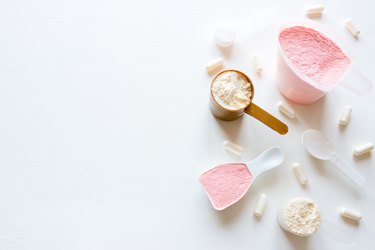
Protein shakes are supposed to help you build muscle, recover faster and perform better. For some people, though, downing a protein shake after a workout spells trouble. That gurgly feeling you get in your stomach after you drink the last sip can have you running for the bathroom, which is not a fun way to relax after a tough exercise session. If protein shake diarrhea has you down, find out the root of your problem then take steps to find a better alternative.
You're Lactose Intolerant
Video of the Day
Milk is the most common base for a protein shake because it tastes good, it mixes well and it contains protein. But milk contains a sugar called lactose that some people just can't process effectively. Your protein powder may also contain lactose. Whey protein concentrate powders can be high in lactose, according to Lucas Duppler, MS, CISSN, and may not be the best protein for stomach problems. Whey protein isolate tends to be higher in protein and lower in carbohydrates — including natural sugars — and therefore is usually safe for people with lactose intolerance.
Video of the Day
Symptoms of lactose intolerance include nausea, vomiting, swelling, colic gas and diarrhea. If you think lactose intolerance could be the culprit, look for whey protein isolate or choose a different protein source such as egg, pea, rice or hemp protein, which may be a better protein powder for a sensitive stomach.
It's the Sweeteners
Look closely at the ingredients list of your protein powder of choice. Do you see any words ending in "-ol"? That's a sure sign there is some sort of sugar substitute in there. Substances like xylitol, mannitol and sorbitol are made from plants but their carbohydrates are altered via a chemical process, according to Joslin Diabetes Center. When your goal is to get lean, artificial sweeteners sound like a good idea for cutting calories, but there's a downside: These faux sweeteners can have a laxative effect and lead to bloating, gas and diarrhea.
Even pure sugar can cause diarrhea, reports Harvard Medical School. Sugar causes the gut to expel water and electrolytes, which loosen the bowels. Too much sugar — especially fructose, the kind found naturally in fruits, such as pears and apples — in your protein shake can cause stomach trouble.
The solution: Read the label on your chosen protein powder carefully. Look for one that contains low or no sugar and without artificial sweeteners.
You Drank Too Soon After Exercise
If you've barely set down the weights before you start on your protein shake, your stomach just might not be ready for it. Exercise impacts your digestive system in various ways. Small bowel transit is delayed and intestinal absorption may be compromised. It's a good idea to wait a little while after your workout to let your system recover homeostasis before you ask it to process 20 ounces of protein.
You Drank Too Quickly
Consuming anything too quickly can lead to stomach upset. Because it's liquid, a protein shake is much easier to drink quickly than a solid food meal. That's a lot of material for your gut to process all at once, and it may let you know in a way you'd rather not. Try sipping your shake more slowly and see if that helps your tummy troubles.
- Mayo Clinic: Lactose intolerance
- WheyofLife.org: What’s the Difference Between Whey Protein Isolate and Concentrate?
- Joslin Diabetes Center: What Are Sugar Alcohols?
- Harvard Medical School: Is something in your diet causing diarrhea?
- Sports Medicine: The effect of exercise on the gastrointestinal tract.